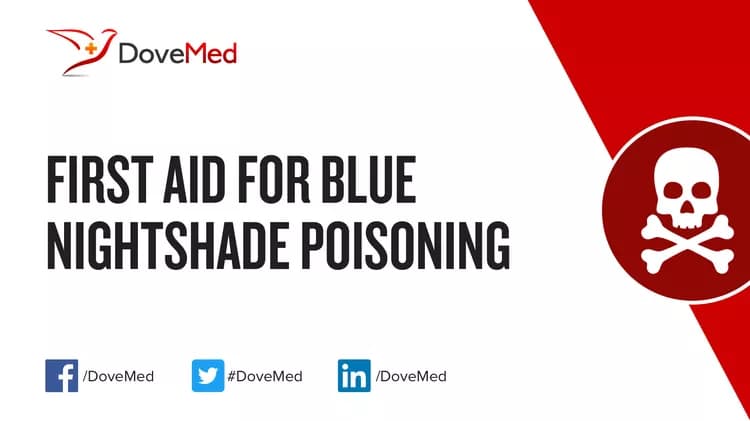What is Blue Nightshade Poisoning?
- Blue Nightshade (botanical name Solanum dulcamara) is a herbaceous plant seen across regions of Europe, America, and Asia. The plant is also known as bittersweet nightshade
- Blue Nightshade Poisoning is the accidental or intentional intake of the plant or plant product containing the compound
- The condition is diagnosed based upon the clinical history, combination of signs and symptoms, and additional tests (that may include, in some cases, radiological studies and laboratory tests)
Blue Nightshade Poisoning may be also referred to variously as the following:
- Bitter Nightshade Poisoning
- Bittersweet Nightshade Poisoning
- Blue Nightshade Toxicity
- Deadly Nightshade Poisoning
- Fellen Poisoning
- Felonwort Poisoning
- Fever Twig Poisoning
- Scarlet Berry Poisoning
- Scarlet Berry Poisoning
- Snake Berry Poisoning
- Solanum Dulcamara Poisoning
- Staff Vine Poisoning
- Violet-Bloom Poisoning
- Weedy Nightshade Poisoning
- Woody Nightshade Poisoning
What are the Causes of Blue Nightshade Poisoning?
- Blue Nightshade Poisoning is caused by eating blue nightshade plant or plant products
- This intake could be accidental, or in some cases intentional, to bring self-harm
- The poisonous part of the plant is atropine and solanine (a highly-toxic substance) that is mainly found in the fruits and leaves
Note: The compound can interact with other prescribed or non-prescribed medications in the body. Such interactions may enhance the therapeutic effects of other medications being taken, resulting in undesired side effects.
What are the Signs and Symptoms of Blue Nightshade Poisoning?
The signs and symptoms of Blue Nightshade Overdose can vary from one individual to another. It may be mild in some and severe in others. Several systems of the body, such as the digestive system, nervous system, vascular system, urinary system, and ENT may be affected.
The signs and symptoms of Blue Nightshade Poisoning may include:
- Headache
- Nausea, vomiting
- Diarrhea
- Fever, profuse sweating
- Abdominal or stomach pain
- Pupil dilation
- Dryness of the mouth
- Breathing difficulties
- Weak or low pulse
- Numbness
- Delirium, hallucinations
- Shock and paralysis
How is First Aid administered for Blue Nightshade Poisoning?
First Aid tips for Blue Nightshade Poisoning:
- Call 911 or your local emergency help number immediately, for emergency assistance
- Call the Poison Control Center at 1-800-222-1222 (or your local poison control center) for further instructions
- Provide them with information such as the compound taken, quantity and time of ingestion, age, weight and general health status of affected individual
- Confirm that the airways are protected; also, ensure breathing and the presence of pulse
- Unless instructed by a healthcare professional, DO NOT induce vomiting in the affected individual
- Take individual to emergency room (ER) for further treatment
- Always try to take the plant or plant product to the ER
The emergency medical health professional might perform the following steps towards treating the condition:
- Gastric lavage for elimination of the substance from the stomach (irrigation using special solutions)
- Medically manage symptoms, such as abnormal heart rate and seizures
- Provide breathing support, if necessary
- Administer activated charcoal to avoid absorbance of the substance in the body
- Administer laxatives for elimination of the substance from the body
- Administer fluids by an intravenous drip line
Who should administer First Aid for Blue Nightshade Poisoning?
First aid for Blue Nightshade Poisoning is administered by healthcare professionals.
- The individual who is affected, or someone near, should call 911 for emergency assistance (or the local emergency number)
- They should also call the poison control center at 1-800-222-1222 (or the local poison control center) and follow instructions
What is the Prognosis of Blue Nightshade Poisoning?
- The prognosis of Blue Nightshade Poisoning is dependent on the amount of substance consumed, time between consumption and treatment, severity of the symptoms, as well as general health status of the patient
- If the individual can recover from the symptoms that occur due to mild poisoning, the outcome is generally good, with appropriate medication and early support
- In case of severe symptoms due to severe contact/poisoning, it may worsen the outcome and/or prolong time of recovery
In general, toxicities are common situations in the emergency departments. A majority of the cases are often not fatal, when appropriate treatment is given.
How can Blue Nightshade Poisoning be Prevented?
Blue Nightshade Poisoning can be prevented by:
- Avoiding eating wild berries and plants, especially if you have no information about them
- Following working in the garden or fields, hiking, or camping, always wash hands thoroughly, prior to eating anything
- Always follow instructions for usage of any health or cosmetic products
- Keeping cosmetics, medications, and other healthcare products out of reach of children in child-proof containers
- Being aware of basic first aid steps in case of an emergency (such as inadvertent poisoning)
It is important to give your healthcare provider a complete list of prescription and non-prescription medications that are being currently taken. This will help them in assessing the possible drug interactions within various medications and help avoid/prevent accidental or unintentional toxic drug effects.
What are certain Crucial Steps to be followed?
- Call 911 (or your local emergency number) for emergency assistance, if symptoms are life-threatening
- Call Poison Control Center at 1-800-222-1222 (or the local poison control center) and follow the recommend steps
- It would be helpful if the following information is readily available:
- Type, amount and time of consumption of the substance
- Age and weight of the individual
- And, the overall health status of the individual
Related Articles
Test Your Knowledge
Asked by users
Related Centers
Related Specialties
Related Physicians
Related Procedures
Related Resources
Join DoveHubs
and connect with fellow professionals


0 Comments
Please log in to post a comment.